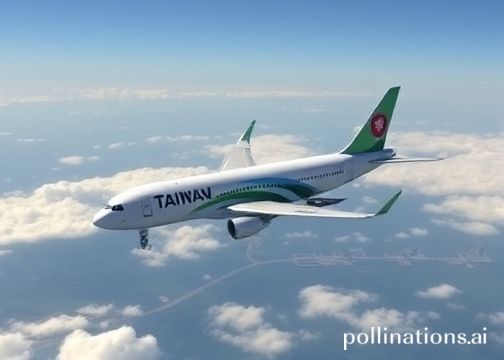Taiwan Soars Towards Sustainability: Sustainable Aviation Fuel Takes Flight
Taiwanese Airlines Embrace Eco-Friendly Fuel to Reduce Carbon Footprint and Pave the Way for a Greener Future

In a significant step towards environmental sustainability, Taiwan is introducing sustainable aviation fuel (SAF) at its airports, marking a pivotal moment in the nation's commitment to combating climate change. The Ministry of Transportation and Communications announced that approximately 6,000 tonnes of SAF will be available this year for both domestic and international airlines operating in Taiwan, with the potential to curb roughly 15,000 tonnes of carbon emissions.
This initiative is a crucial part of the Taiwanese government's broader strategy to achieve net-zero emissions by 2050.
The nation's leading airlines, China Airlines Ltd (中華航空), EVA Airways Corp (EVA, 長榮航空), and Starlux Airlines Co (星宇航空), have already begun incorporating SAF into their operations. This marks the first time domestic airlines in Taiwan have utilized eco-friendly fuel.
Minister of Transportation and Communications Chen Shih-kai (陳世凱), along with other key figures, attended an inauguration ceremony at Kaohsiung International Airport to celebrate this milestone.
CPC Corp, Taiwan (台灣中油) has imported 400 tonnes of SAF for use this year, while Formosa Petrochemical Corp (台塑石化) has produced 5,500 tonnes, the ministry reported. China Airlines and Starlux are utilizing the CPC-imported SAF, and EVA Airways is using the fuel produced by Formosa Petrochemical.
The ceremony, held shortly after Earth Day, saw the pumping of SAF into aircraft from China Airlines and EVA Airways. Video presentations highlighted the use of SAF by EVA and Starlux at Taipei International Airport (Songshan airport) and Taiwan Taoyuan International Airport.
The choice of Kaohsiung International Airport for the ceremony was strategic, as it was the first airport in Taiwan to receive carbon footprint certification from Airport Council International in 2014, earning it the title of the nation’s first green airport, according to Ho Shu-ping (何淑萍), the Civil Aviation Administration Director-General.
“Making SAF available at international airports is a global trend as international airlines seek to reduce carbon emissions in accordance with the regulations stipulated by the International Civil Aviation Organization,” Ho stated.
“Like other countries, we are encouraging, rather than mandating, that Taiwanese airlines use SAF. Hopefully, by 2030, at least 5 percent of the total aviation fuel would be SAF,” she added.
CPC and Formosa Petrochemical secured certifications from the Carbon Offsetting and Reduction Scheme for International Aviation in December of the previous year and February, respectively.
"CPC will begin producing SAF next year," stated Fang Jeng-zen (方振仁), CPC chairman. "The main problem is importing waste cooking oil from other countries, which we would resolve by working with the Ministry of Environment."
Kao Shing-hwang (高星潢), China Airlines chairman, noted that while the current supply of SAF is limited, China Airlines will start using it on flights to EU nations, which have begun implementing fuel regulations. He also mentioned that while SAF usage increases fuel costs initially, these costs are expected to decrease with increased supply. When questioned about the possibility of rising airfares, Kao clarified that ticket prices primarily reflect supply and demand dynamics in the commercial aviation market.
Other Versions
Taiwán vuela hacia la sostenibilidad: El combustible de aviación sostenible alza el vuelo
Taiwan s'envole vers la durabilité : Le carburant aviation durable prend son envol
Taiwan Melejit Menuju Keberlanjutan: Bahan Bakar Penerbangan Berkelanjutan Mulai Terbang
Taiwan vola verso la sostenibilità: Il carburante sostenibile per l'aviazione prende il volo
台湾、持続可能性に向けて急上昇:持続可能な航空燃料が空を飛ぶ
지속 가능성을 향해 비상하는 대만: 지속 가능한 항공 연료의 비행
Ang Taiwan ay Lumilipad Patungo sa Pagpapanatili: Ang Sustainable Aviation Fuel ay Umuusad
Тайвань взлетает к устойчивому развитию: Экологически чистое авиационное топливо отправляется в полет
ไต้หวันทะยานสู่ความยั่งยืน: เชื้อเพลิงการบินแบบยั่งยืนทะยานขึ้น
Đài Loan Vươn Tới Sự Bền Vững: Nhiên liệu hàng không bền vững cất cánh
